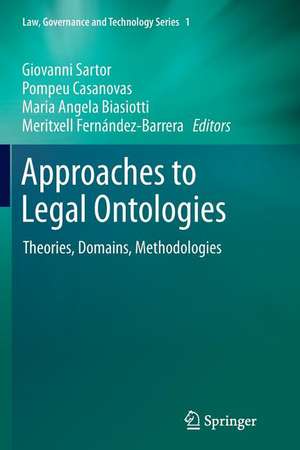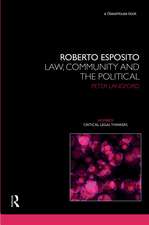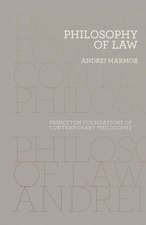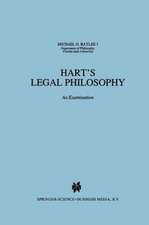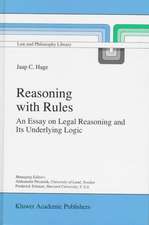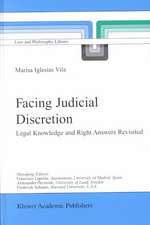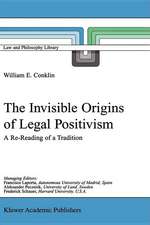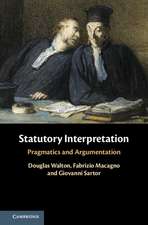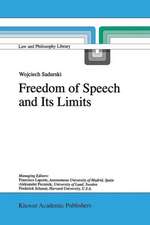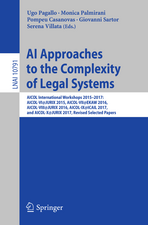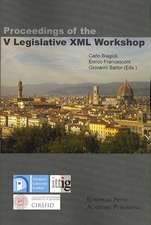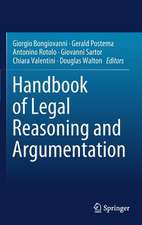Approaches to Legal Ontologies: Theories, Domains, Methodologies: Law, Governance and Technology Series, cartea 1
Editat de Giovanni Sartor, Pompeu Casanovas, Mariangela Biasiotti, Meritxell Fernández-Barreraen Limba Engleză Paperback – 27 ian 2013
| Toate formatele și edițiile | Preț | Express |
|---|---|---|
| Paperback (1) | 640.37 lei 6-8 săpt. | |
| SPRINGER NETHERLANDS – 27 ian 2013 | 640.37 lei 6-8 săpt. | |
| Hardback (1) | 646.62 lei 6-8 săpt. | |
| SPRINGER NETHERLANDS – 30 dec 2010 | 646.62 lei 6-8 săpt. |
Din seria Law, Governance and Technology Series
- 18%
 Preț: 950.33 lei
Preț: 950.33 lei - 24%
 Preț: 645.13 lei
Preț: 645.13 lei - 20%
 Preț: 691.10 lei
Preț: 691.10 lei - 20%
 Preț: 574.08 lei
Preț: 574.08 lei - 20%
 Preț: 879.83 lei
Preț: 879.83 lei - 20%
 Preț: 878.78 lei
Preț: 878.78 lei - 15%
 Preț: 720.23 lei
Preț: 720.23 lei - 18%
 Preț: 1122.56 lei
Preț: 1122.56 lei - 18%
 Preț: 1130.27 lei
Preț: 1130.27 lei - 15%
 Preț: 642.83 lei
Preț: 642.83 lei - 18%
 Preț: 950.52 lei
Preț: 950.52 lei - 18%
 Preț: 1009.85 lei
Preț: 1009.85 lei - 18%
 Preț: 1115.14 lei
Preț: 1115.14 lei - 15%
 Preț: 653.14 lei
Preț: 653.14 lei - 18%
 Preț: 949.23 lei
Preț: 949.23 lei - 18%
 Preț: 1014.76 lei
Preț: 1014.76 lei - 15%
 Preț: 638.43 lei
Preț: 638.43 lei - 18%
 Preț: 1124.30 lei
Preț: 1124.30 lei - 18%
 Preț: 1124.60 lei
Preț: 1124.60 lei - 18%
 Preț: 999.45 lei
Preț: 999.45 lei - 18%
 Preț: 892.42 lei
Preț: 892.42 lei - 18%
 Preț: 947.35 lei
Preț: 947.35 lei - 20%
 Preț: 340.32 lei
Preț: 340.32 lei - 18%
 Preț: 1692.20 lei
Preț: 1692.20 lei - 18%
 Preț: 954.93 lei
Preț: 954.93 lei - 24%
 Preț: 789.37 lei
Preț: 789.37 lei -
 Preț: 397.59 lei
Preț: 397.59 lei - 20%
 Preț: 876.60 lei
Preț: 876.60 lei - 20%
 Preț: 652.41 lei
Preț: 652.41 lei - 18%
 Preț: 900.49 lei
Preț: 900.49 lei - 18%
 Preț: 941.50 lei
Preț: 941.50 lei -
 Preț: 392.97 lei
Preț: 392.97 lei
Preț: 640.37 lei
Preț vechi: 753.39 lei
-15% Nou
Puncte Express: 961
Preț estimativ în valută:
122.55€ • 133.07$ • 102.94£
122.55€ • 133.07$ • 102.94£
Carte tipărită la comandă
Livrare economică 22 aprilie-06 mai
Preluare comenzi: 021 569.72.76
Specificații
ISBN-13: 9789400734753
ISBN-10: 9400734751
Pagini: 296
Ilustrații: XIV, 282 p.
Dimensiuni: 155 x 235 x 16 mm
Greutate: 0.42 kg
Ediția:2011
Editura: SPRINGER NETHERLANDS
Colecția Springer
Seria Law, Governance and Technology Series
Locul publicării:Dordrecht, Netherlands
ISBN-10: 9400734751
Pagini: 296
Ilustrații: XIV, 282 p.
Dimensiuni: 155 x 235 x 16 mm
Greutate: 0.42 kg
Ediția:2011
Editura: SPRINGER NETHERLANDS
Colecția Springer
Seria Law, Governance and Technology Series
Locul publicării:Dordrecht, Netherlands
Public țintă
ResearchCuprins
Foreword; Pompeu Casanovas, Giovanni Sartor.- Preface; Barry Smith.- 1 Introduction. Theory and Methodology in Legal Ontology Engi-neering: Experiences and Future Directions; Pompeu Casanovas, Giovanni Sartor, Maria Angela Biasiotti, Meritxell Fernández-Barrera.- 2 The Legal Theory Perspective: Doctrinal Conceptual Systems vs. Computational Ontologies; Meritxell Fernández-Barrera, Giovanni Sartor.- 3 Empirically Grounded Development of Legal Ontologies: a Socio-Legal Perspective; Pompeu Casanovas, Núria Casellas, Joan-Josep Vallbé.- 4 A Cognitive Science Perspective on Legal Ontologies; Joost Breuker, Rinke Hoekstra.- 5 Social Ontology and Documentality; Maurizio Ferraris.- 6 The Case-Based Reasoning Approach: Ontologies for Analogical Legal Argument; Kevin D. Ashley.- 7 A Complex-System Approach: Legal Knowledge, Ontology, In-formation and Networks; Pierre Mazzega, Danièle Bourcier, Paul Bourgine, Nadia Nadah, Romain Boulet.- 8 The Multi-layered Legal Information Perspective; Guido Boella, Piercarlo Rossi.- 9 Legal Ontologies: the Linguistic Perspective; Maria Angela Biasiotti, Daniela Tiscornia.- 10 A Legal Document Ontology: the Missing Layer in Legal Docu-ment Modelling; Monica Palmirani, Luca Cervone, Fabio Vitali.- 11 From Thesaurus towards Ontologies in Large Legal Databases; Ángel Sancho Ferrer, Carlos Fernández Hernández, José Manuel Mateo Rivero.- 12 The Computational Ontology Perspective: Design Patterns for Web Ontologies; Aldo Gangemi, Valentina Presutti, Eva Blomqvist.- 13 A Learning Approach for Knowledge Acquisition in the Legal Domain; Enrico Francesconi.- 14 Towards an Ontological Foundation for Services Science: the Legal Perspective; Roberta Ferrario, Nicola Guarino, Meritxell Fernández-Barrera.- 15 Legal Multimedia Ontologies and Semantic Annotation for Search and Retrieval; Jorge González-Conejero.- Index.
Textul de pe ultima copertă
Legal ontologies have proved crucial for representing, processing and retrieving legal information, and will acquire an increasing significance in the emerging framework of the Semantic Web. Despite the many research projects in the field, a collective reflection on the theoretical foundations of legal ontology engineering was still missing. This book bridges the gap, by exploring current methodologies and theoretical approaches to legal ontologies. It gathers 16 papers, each of them presenting issues and solutions for ontology engineering related to a particular approach to, or aspect of, the law: comparative law, case-based reasoning, multilingualism, complex- systems, sociolegal analysis, legal theory, social ontology, ontology learning, computational ontology, service ontology, cognitive science, document modelling, large legal databases, scientific, linguistic and legal-technology perspectives. The book will thus interest researchers in legal informatics, artificial intelligence and law, legal theory, legal philosophy, legal sociology, comparative law, as well as developers of applications based on the intelligent management of legal information, in both e-commerce and e-government (e-administration, e-justice, e-democracy).
Caracteristici
Goes beyond the presentation of particular results in developing legal ontologies Unique gathering of leading experts in the field Provides a unique theoretical reflection on legal ontology engineering
